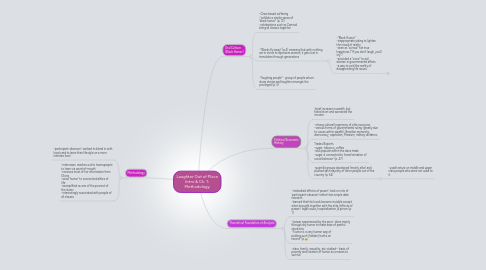Laughter Out of Place Intro & Ch. 1: Methodology
by Aleczandria Sorrell


1. Methodology
1.1. -participant-observer': worked to blend in with locals and to learn their lifestyle on a more intimate level
1.2. -interviews: reaches out to townspeople to learn via word-of-mouth -receives most of her information from Gloria -used 'humor' to survive brutalities of life -exemplified as one of the poorest of the slums -interestingly associated with people of all classes
2. Oral Culture (Black Humor)
2.1. -Class-based suffering -'exhibits a similar sense of 'black humor" (p. 12) -celebrations such as Carnival bring all classes together
2.2. -"Words fly away" (p.4) meaning that with nothing set in stone to represent women, it gets lost in translation through generations
2.2.1. -"Black Humor" -inappropriate joking to lighten the mood of reality -seen as "sorrow" not true happiness ("If you don't laugh, you'll cry") -provided a "voice" to aid women in governmental affairs -a way to void the reality of disappointing life issues
2.2.1.1. ex) joking about death of family, diseases
2.3. -"laughing people" - group of people whom share stories and laughter amongst the privileged (p. 5)
3. Political/Economic History
3.1. -brief increase in wealth, but failed short and worsened the income
3.2. -strong cultural hegemony of elite over poor -various forms of governmental ruling (greatly due to issues within wealth): Brazilian monarchy, democracy, capitalism, Marxism, military dictators
3.3. Trades/Exports -sugar, tobacco, coffee -also popular within the slave trade -sugar is connected to 'transformation of social behavior' (p. 47)
3.4. -guerrilla groups developed (mainly elite) and pushed vast majority of other people out of the country (p. 54)
3.4.1. -used torture on middle and upper class people who were not used to it
